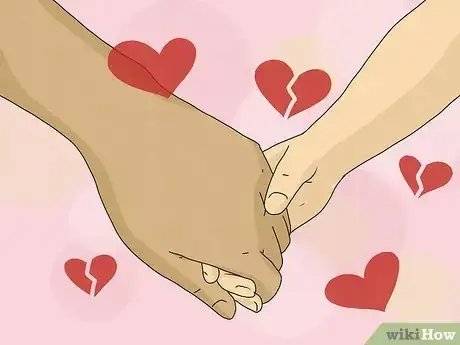This article was co-authored by Kelli Miller, LCSW, MSW and by wikiHow staff writer, Dev Murphy. Kelli Miller is a Psychotherapist based in Los Angeles, California. Kelli specializes in individual and couples therapy focusing on relationships, depression, anxiety, sexuality, communication, parenting, and more. Kelli also facilitates groups for those struggling with alcohol and drug addiction as well as anger management groups. She is the author of “Professor Kelli’s Guide to Finding a Husband” and the award-winning and best-selling book “Thriving with ADHD”. Kelli co-hosted an advice show on LA Talk Radio and is a relationship expert for The Examiner. She received her MSW (Masters of Social Work) from the University of Pennsylvania and a BA in Sociology/Health from the University of Florida.
This article has been viewed 4,692 times.
We’ve all heard the saying “Once a cheater, always a cheater.” But does it ring true? Just because someone cheats once, does it mean they will cheat again? Turns out, it’s not quite that simple (is anything, ever?). There are a lot of factors that go into why somebody might have an affair, making the statement “Once a cheater, always a cheater” less black and white than it may seem. If you want to learn more, keep reading. We’ve got the downlow on infidelity: why it happens, signs someone might cheat again, and whether the phrase "Once a cheater, always a cheater" has any truth to it.
Things You Should Know
- “Once a cheater, always a cheater” is not always true. A person who has cheated may never cheat again, or they may cheat many times.
- Someone who has cheated in the past is statistically more likely to cheat in the future than someone who hasn’t, but this doesn’t guarantee a repeat offender.
- People cheat for all sorts of reasons: low self-esteem, relationship dissatisfaction, or just for the thrill. None of these are excuses for betrayal.
- Keep an eye out for red flags that someone may cheat again, including insincere apologies, continual lying (even tiny lies!), and belittling past infidelity.
Steps
Expert Q&A
-
QuestionHow do you get back trust after your partner cheats?
 Kelli Miller, LCSW, MSWKelli Miller is a Psychotherapist based in Los Angeles, California. Kelli specializes in individual and couples therapy focusing on relationships, depression, anxiety, sexuality, communication, parenting, and more. Kelli also facilitates groups for those struggling with alcohol and drug addiction as well as anger management groups. She is the author of “Professor Kelli’s Guide to Finding a Husband” and the award-winning and best-selling book “Thriving with ADHD”. Kelli co-hosted an advice show on LA Talk Radio and is a relationship expert for The Examiner. She received her MSW (Masters of Social Work) from the University of Pennsylvania and a BA in Sociology/Health from the University of Florida.
Kelli Miller, LCSW, MSWKelli Miller is a Psychotherapist based in Los Angeles, California. Kelli specializes in individual and couples therapy focusing on relationships, depression, anxiety, sexuality, communication, parenting, and more. Kelli also facilitates groups for those struggling with alcohol and drug addiction as well as anger management groups. She is the author of “Professor Kelli’s Guide to Finding a Husband” and the award-winning and best-selling book “Thriving with ADHD”. Kelli co-hosted an advice show on LA Talk Radio and is a relationship expert for The Examiner. She received her MSW (Masters of Social Work) from the University of Pennsylvania and a BA in Sociology/Health from the University of Florida.
Psychotherapist First, be patient with yourself because it takes time to trust again. You may not trust them right away, but you can regain your trust. Talk to them about how you feel, and pay attention to their actions. Over time, you'll learn to trust again if your partner is reliable and honest.
First, be patient with yourself because it takes time to trust again. You may not trust them right away, but you can regain your trust. Talk to them about how you feel, and pay attention to their actions. Over time, you'll learn to trust again if your partner is reliable and honest.
References
- ↑ https://pubmed.ncbi.nlm.nih.gov/28785917/
- ↑ https://pubmed.ncbi.nlm.nih.gov/28785917/
- ↑ https://www.scientificamerican.com/article/why-do-people-in-relationships-cheat/
- ↑ https://psychcentral.com/blog/sex-addiction/2014/12/can-serial-cheaters-change#1
- ↑ https://www.scientificamerican.com/article/why-do-people-in-relationships-cheat/
- ↑ https://www.scientificamerican.com/article/why-do-people-in-relationships-cheat/
- ↑ https://psychcentral.com/blog/sex-addiction/2014/12/can-serial-cheaters-change#1
- ↑ https://www.baltimoretherapycenter.com/once-a-cheater-always-a-cheater-true-or-false/
- ↑ https://brenebrown.com/podcast/harriet-lerner-and-brene-im-sorry-how-to-apologize-why-it-matters-part-1-of-2/







































































Medical Disclaimer
The content of this article is not intended to be a substitute for professional medical advice, examination, diagnosis, or treatment. You should always contact your doctor or other qualified healthcare professional before starting, changing, or stopping any kind of health treatment.
Read More...